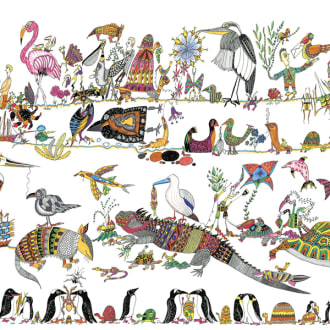The Best of MIT Press
10+ most popular MIT Press articles, as voted by our community.
MIT Press on Brain
What Are Flashbulb Memories?
An excerpt from “Memory,” a primer on human memory, its workings, feats, and flaws, by two leading psychological researchers.
Finding Language in the Brain
Psycholinguist Giosuè Baggio sheds light on the thrilling, evolving field of neurolinguistics, where neuroscience and linguistics meet.
MIT Press on Consciousness
How Did Consciousness Evolve? An Illustrated Guide
Two leading voices in evolutionary consciousness science explore the subject through words and images.
MIT Press on Environment
An Environmentalist’s Lessons for an Improvisational Life
Improvisation is the essence of environmental learning, sparking the imagination, stimulating creativity, and helping us reinvigorate how we think about our residency on Earth.
«watching the breeze gently ruffle the patches of open water»
MIT Press on History
The Deep and Enduring History of Universal Basic Income
While the concept stretches back centuries, it has garnered significant attention in recent decades.
What 250 Years of Innovation History Reveals About Our Green Future
If history is any indication, an unstoppable wave of competitive innovations is heading our way again.
«As do our jobs. Our answers to that old question “What do you do?” change: “I design webpages and facilitate SoMe.” That would be social media, by the way. In 1995, both the job itself and the answer would be utter gibberish. With each technical wave also come new social discourses.»
MIT Press on Meditation
On Meditation and the Unconscious: A Buddhist Monk and a Neuroscientist in Conversation
An excerpt from "Beyond the Self: Conversations between Buddhism and Neuroscience."
MIT Press on Poetry
Can AI Write Authentic Poetry?
Cognitive psychologist and poet Keith Holyoak explores whether artificial intelligence could ever achieve poetic authenticity.
MIT Press on Psychology
The Psychological Depths of Rock-Paper-Scissors
An excerpt from veteran game designer Greg Costikyan's book "Uncertainty in Games."
«Unless you have lived in a Skinner box from an ear»
The Hidden Powers of Everyday Ritual
Psychological anthropologist Bradd Shore explores the subtle but powerful influence of rituals on shaping our lives.
MIT Press on Science
What the Science Actually Says About Unconscious Decision Making
There is no free lunch when it comes to tricky decisions; you have to do the thinking.
«Albert Einstein once noted that “intuition is nothing but the outcome of earlier intellectual experience.”»
The Two-Century Quest to Quantify Our Senses
The quantification of bodies, senses, and experience did not begin with surveillance capitalism but can be traced back to mathematical and statistical techniques of the 19th century.
«Emerging experimental psychology laboratories wanted to create a new kind of human being: quantifiable, calculable, and predictable.»
Popular
These are some all-time favorites with Refind users.
Running and the Science of Mental Toughness
There is more to running than just training your muscles and improving your stamina. It is also a mental sport, and maybe even more so than previously believed.
«In his opinion, what runners refer to as exhaustion has nothing to do with their physical ability to carry on or not. It is simply a matter of deciding to give up.»
Aldous Huxley's Deep Reflection
Huxley was a very special kind of expert witness to his own unusual states of consciousness, which he actively cultivated in the service of his writing.
The Extraordinary Ways Rhythm Shapes Our Lives
Rhythm plays an important role in how we perceive — and connect with — the world.
A Philosopher's Case Against Death
The acceptance of death is deeply embedded in our culture; it's time to overthrow that idea.
The Myth of Objective Data
When we view objectivity and subjectivity as opposites rather than complements, we distort the empirical realities of data collection.
«This despair helps my students recognize an apparently banal assignment as a real design situation. It teaches them that data is created, not found; and that creating it well demands humanity, rather than objectivity.»
What is Refind?
Every day Refind picks the most relevant links from around the web for you. is one of more than 10k sources we monitor.
How does Refind curate?
It’s a mix of human and algorithmic curation, following a number of steps:
- We monitor 10k+ sources and 1k+ thought leaders on hundreds of topics—publications, blogs, news sites, newsletters, Substack, Medium, Twitter, etc.
- In addition, our users save links from around the web using our Save buttons and our extensions.
- Our algorithm processes 100k+ new links every day and uses external signals to find the most relevant ones, focusing on timeless pieces.
- Our community of active users gets the most relevant links every day, tailored to their interests. They provide feedback via implicit and explicit signals: open, read, listen, share, mark as read, read later, «More/less like this», etc.
- Our algorithm uses these internal signals to refine the selection.
- In addition, we have expert curators who manually curate niche topics.
The result: lists of the best and most useful articles on hundreds of topics.
How does Refind detect «timeless» pieces?
We focus on pieces with long shelf-lives—not news. We determine «timelessness» via a number of metrics, for example, the consumption pattern of links over time.
How many sources does Refind monitor?
We monitor 10k+ content sources on hundreds of topics—publications, blogs, news sites, newsletters, Substack, Medium, Twitter, etc.
Can I submit a link?
Indirectly, by using Refind and saving links from outside (e.g., via our extensions).
How can I report a problem?
When you’re logged-in, you can flag any link via the «More» (...) menu. You can also report problems via email to hello@refind.com
Who uses Refind?
450k+ smart people start their day with Refind. To learn something new. To get inspired. To move forward. Our apps have a 4.9/5 rating.
Is Refind free?
Yes, it’s free!
How can I sign up?
Head over to our homepage and sign up by email or with your Twitter or Google account.
















